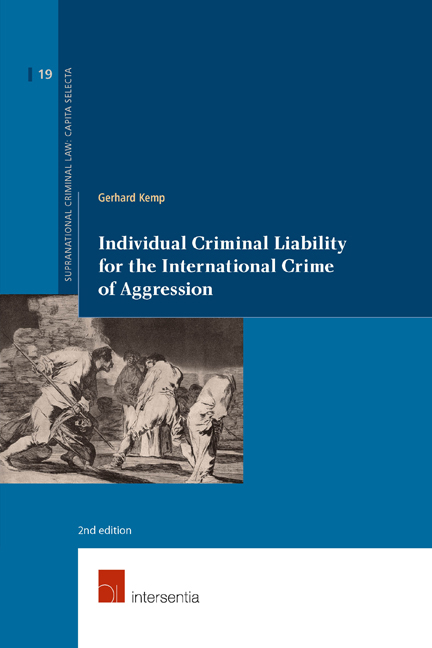Book contents
- Frontmatter
- Foreword to the Second Edition
- Foreword to the First Edition
- Preface
- Contents
- List of Abbreviations
- PART I INTRODUCTION AND FRAMEWORK OF ANALYSIS
- PART II COLLECTIVE SECURITY AND THE JUS CONTRA BELLUM
- PART III THE CRIMINALISATION OF AGGRESSION
- PART IV THE INTERNATIONAL CRIMINAL COURT AND THE CRIME OF AGGRESSION
- Chapter V The Inclusion of Aggression in the Rome Statute of the International Criminal Court
- Chapter VI Drafting and Diplomacy: The Special Working Group on the Crime of Aggression
- Chapter VII The Crime of Aggression under the Rome Statute of the ICC
- PART V NATIONAL AND REGIONAL CRIMINALISATION AND PROSECUTION OF THE CRIME OF AGGRESSION
- PART VI ANNEXES
Chapter VII - The Crime of Aggression under the Rome Statute of the ICC
from PART IV - THE INTERNATIONAL CRIMINAL COURT AND THE CRIME OF AGGRESSION
Published online by Cambridge University Press: 12 December 2017
- Frontmatter
- Foreword to the Second Edition
- Foreword to the First Edition
- Preface
- Contents
- List of Abbreviations
- PART I INTRODUCTION AND FRAMEWORK OF ANALYSIS
- PART II COLLECTIVE SECURITY AND THE JUS CONTRA BELLUM
- PART III THE CRIMINALISATION OF AGGRESSION
- PART IV THE INTERNATIONAL CRIMINAL COURT AND THE CRIME OF AGGRESSION
- Chapter V The Inclusion of Aggression in the Rome Statute of the International Criminal Court
- Chapter VI Drafting and Diplomacy: The Special Working Group on the Crime of Aggression
- Chapter VII The Crime of Aggression under the Rome Statute of the ICC
- PART V NATIONAL AND REGIONAL CRIMINALISATION AND PROSECUTION OF THE CRIME OF AGGRESSION
- PART VI ANNEXES
Summary
THE KAMPALA REVIEW CONFERENCE
The first review Conference of the Rome Statute of the International Criminal Court took place in Kampala, Uganda, between 31 May and 11 June 2010. A number of proposals were discussed, ranging from proposals to include the crimes of terrorism and drug trafficking within the jurisdiction of the ICC, to the criminalisation of the use of nuclear weapons. The most prominent proposal – on the definition of the crime of aggression and the concomitant proposal on the conditions for the exercise of ICC jurisdiction over the crime of aggression – was eventually also one of the two successful substantive proposals. The other substantive proposal concerned the extension of the prohibition of certain types of weapons (including poisonous weapons) in the context of non-international armed conflicts as war crimes.
Observers at the Kampala Conference noted the fact that the eventual decision on the crime of aggression was made by consensus. Big powers gave serious input. Even the United States, a non-party participant but not part of the final decision, also made a serious substantive contribution. The drafting and diplomacy of the preceding decade thus culminated in an historic agreement.
THE DEFINITION OF AGGRESSION
Article 8bis, containing the definition of the crime of aggression under the Rome Statute, is the result of the work done by the Special Working Group. The main aspects of the proposals and draft texts were discussed in Chapter VI.
The unlawful behaviour is criminalised in the first part of Article 8bis. The second part of Article 8bis contains the acts of aggression that are unlawful use of force by a state in violation of international law (essentially, but with some modification, the jus contra bellum discussed in Chapter II).
THE STATE ACT OF AGGRESSION
In order to understand the scope of criminal acts that are criminalised under Article 8bis, the starting point of the analysis is the list of acts provided for in the second part of Article 8bis. The criminal scope of these acts are determined by (a) the content of the state acts as unlawful use of armed force in violation of the UN Charter, and (b) the threshold provided for in the first part of Article 8bis.
- Type
- Chapter
- Information
- Publisher: IntersentiaPrint publication year: 2015



